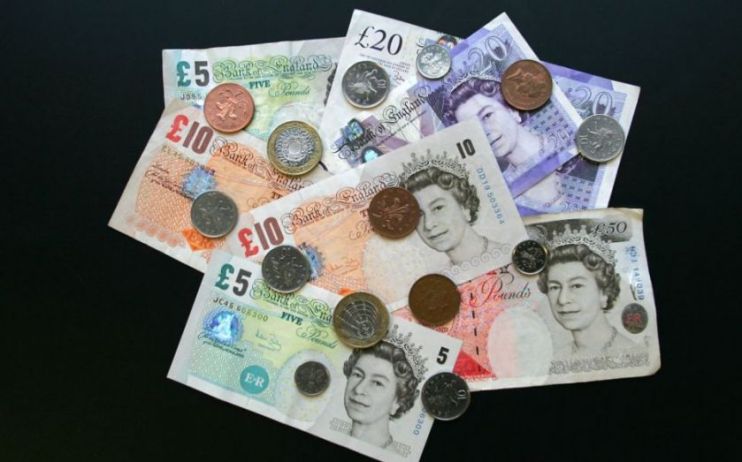Sterling suffers as public sector debt more than doubles to £7.2bn

Sterling sank this morning as official data revealed public sector borrowing more than doubled to £7.2bn last month, blasting past economists’ forecasts to record the highest June total since 2015.
The net borrowing figure is more than double the £3.3bn recorded this time last year, the Office for National Statistics (ONS) warned, and smashed a Reuters poll of economists’ predictions.
Read more: Low Eurozone growth could see borrowing rise sharply
Year-to-date borrowing rose by £4.5bn year on year to hit £17.9bn, the ONS added.
The pound dropped 0.28 per cent against the dollar to 1.251 on the news as economists warned the next Prime Minister faces a challenge to revive the public finances.
A “notable increase” in spending on goods and services occurred in June, totalling £1.2bn over the month, while the UK’s EU contributions climbed £400m higher than a year ago.
Meanwhile central government tax receipts rose by 1.5 per cent – £800m – to £58.7bn.
Government spending was up 7.2 per cent, or £4.3bn, to £64.8bn.
Overall public debt hit £1.8 trillion at the end of June, equivalent to 83.1 per cent of GDP.
That is £27bn higher than June 2018, which is actually a drop of 1.5 percentage points of GDP as output has grown over the last 12 months.
Howard Archer, chief economic adviser to the EY Item Club, said the statistics would prove “disappointing news” to the next Prime Minister – due to be announced at the end of the month.
“June meant that the public finances have seen year-on-year deterioration through the first three months of fiscal year 2019-20,” he added.
Read more: Philip Hammond ‘may quit before Boris can sack him’
“Much will depend on whether the economy can shrug off its current weakness as well as on Brexit developments,” Archer said.
“It will also be influenced by any changes to fiscal policy by the new Prime Minister and chancellor.”
Mike Jakeman, senior economist at PwC, said the public finances appear to be in good shape despite short-term uncertainty over a no-deal Brexit.
That comes as the Office for Budget Responsibility (OBR) predicted the government must borrow an extra £6bn compared to last year.
“Although it appears that the government is on track to borrow far more than this, monthly borrowing is lumpy, and it is still perfectly possible for this target to be met,” Jakeman said.
“Thinking more broadly, the government’s finances are in healthy shape after years of austerity and spending cuts. An increase in borrowing of the magnitude expected by the OBR does not present any fiscal risk.”
The OBR yesterday sounded the alarm around a no-deal Brexit however, saying it could cause a “full-blown” recession in 2020.
Boris Johnson, the favourite to succees Theresa May as Prime Minister, has pledged to quit the EU with or without a deal come 31 October.
Jakeman warned that crashing out of the EU would harm government tax receipts and increase the need for higher spending to mitigate the impact of no deal.
“The government would be likely to have to reconsider its medium-term targets for the deficit and debt,” he said.
“But even if a no-deal Brexit is avoided, a new chancellor is likely to bring new priorities and, with a spending review on the horizon, could sanction a period of looser fiscal policy.”
Read more: No-deal Brexit risk rises to its highest level since October 2017
Johnson has pledged to raising the higher tax rate to £80,000 and could usher in cuts to stamp duty in a bid to boost the UK’s struggling housing market.
A Reuters poll of economists today hiked the risk of a no-deal Brexit as Johnson looks set to win the Conservative leadership contest over rival Jeremy Hunt.
Main image credit: Getty